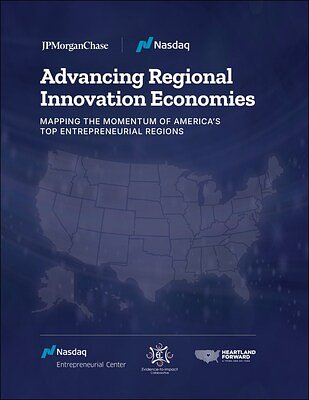
Beyond Silicon Valley: New Report Maps U.S. Entrepreneurial Hotspots
A new study reveals the U.S. cities driving innovation beyond the coastal tech hubs – and it’s not just about venture capital. Angel investing and Main Street expansion play key roles.
Beyond Silicon Valley: New Report Maps U.S. Entrepreneurial Hotspots
Washington, D.C. – November 14, 2025 – Forget the usual suspects. A new report released today by the Nasdaq Entrepreneurial Center, in collaboration with Heartland Forward and Penn State University, is challenging the conventional wisdom about where innovation thrives in the United States. The study, part of the multi-year “Advancing Regional Innovation Economies” (ARiE) initiative, identifies a diverse set of metropolitan areas leading the nation in entrepreneurial growth – and it’s a landscape far broader than Silicon Valley or the established coastal tech hubs.
The report moves beyond solely tracking venture capital funding, integrating data on angel investing and Small Business Administration (SBA) 504 loan activity to paint a more comprehensive picture of entrepreneurial ecosystems. This approach reveals that robust startup activity isn’t limited to areas with significant venture capital presence; many cities are experiencing growth driven by angel investors and the expansion of established “Main Street” businesses.
Beyond the Funding Frenzy: A Holistic View of Growth
For years, venture capital has been considered the gold standard of measuring entrepreneurial success. However, the ARiE report suggests this metric offers an incomplete picture. “We found that focusing solely on venture capital overlooks a significant portion of entrepreneurial activity, particularly in cities that are building more balanced economies,” explains a source involved in the study. “Angel investing often acts as the seed funding for early-stage ventures, while SBA 504 loans are crucial for helping established businesses expand and create jobs.”
The study found that the leading MSAs are not just generating innovative new companies, but also supporting the growth and scaling of traditional small businesses. This duality – the parallel engines of innovation and Main Street expansion – is a key characteristic of these thriving regions.
Education Hubs and Talent Inflows: The Common Threads
While the specific list of the top 20 MSAs remains confidential until full report release, the researchers identified several common characteristics among the leading regions. A strong presence of universities and colleges consistently emerged as a crucial factor. These institutions act as incubators for innovation, fostering research, providing a skilled workforce, and spinning out new companies.
“Universities are no longer just centers of learning; they’re essential components of the entrepreneurial ecosystem,” said an academic researcher involved in the study. “They provide access to talent, research funding, and mentorship opportunities for aspiring entrepreneurs.”
Another common thread was the influx of talent, both from domestic and international sources. Cities that attract skilled workers and graduates are more likely to experience entrepreneurial growth. This is often linked to the availability of jobs, affordable housing, and a vibrant cultural scene. “Talent follows opportunity,” commented a local economic development official. “Cities that create a welcoming environment for skilled workers are more likely to attract entrepreneurs and innovators.”
Policy and Support: Creating a Conducive Environment
The report also highlighted the importance of supportive policies and programs in fostering entrepreneurial ecosystems. This includes tax incentives for startups, reduced regulatory burdens, access to capital, and mentorship opportunities. State and local governments play a crucial role in creating a conducive environment for businesses to thrive.
“We found that cities that actively invest in entrepreneurship, through policies and programs, are more likely to experience growth,” explained a policy analyst involved in the study. “This isn’t just about throwing money at the problem; it’s about creating a supportive ecosystem that encourages innovation and risk-taking.”
Specific legislative initiatives examined included programs encouraging R&D, facilitating technology transfer from universities, and promoting equitable entrepreneurship. The Venture Equity Project, a related initiative examining state-level legislative activity, highlighted the importance of inclusive policies that support entrepreneurs from diverse backgrounds.
Challenging the Conventional Wisdom
The ARiE report challenges the long-held belief that entrepreneurial success is limited to a handful of coastal tech hubs. The study demonstrates that innovation is happening across the country, in cities of all sizes and in a variety of industries.
“We need to move beyond the Silicon Valley model and recognize that entrepreneurial ecosystems can thrive in many different environments,” said a source familiar with the report’s findings. “There's a lot of untapped potential in cities that aren't getting the attention they deserve.”
The report’s findings have significant implications for policymakers, economic development officials, and investors. By understanding the factors that drive entrepreneurial growth in different regions, they can make more informed decisions about how to allocate resources and support innovation.
Looking Ahead
The ARiE initiative is ongoing, and the researchers plan to continue monitoring entrepreneurial ecosystems across the country. They hope that their findings will help to create a more inclusive and sustainable innovation economy. The full report, detailing the specific list of top-performing MSAs and providing in-depth analysis of the key drivers of entrepreneurial growth, will be released in the coming weeks. For now, one message is clear: the future of innovation is not limited to a single place, but is being built in communities across the nation.
